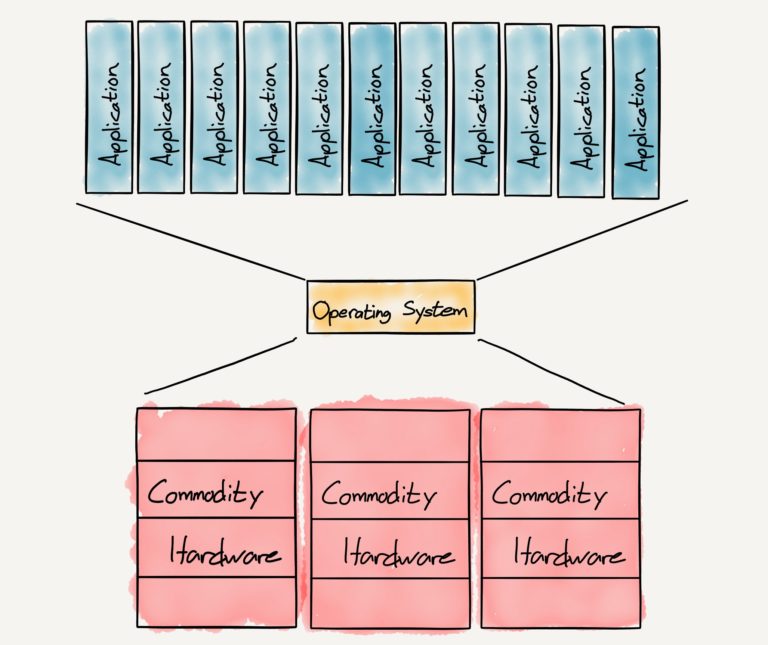Alexa: Amazon’s Operating System (AMZN; MSFT; GOOG; FB)
From Stratechery:
The concept of an operating system is pretty straightforward: it is a
piece of software that manages a computer, making said computer’s
hardware resources accessible to software through a consistent set of
interfaces.

Operating systems have a special allure to technology companies
because of the unique properties that come from being at the center of
this diagram:
- First, by abstracting away the hardware an operating system reduces
the plane of competition for hardware providers to pure performance (as
opposed to, say, lock-in). In the short term this increases competition
amongst hardware providers, which benefits the operating system, and in
the long run, when performance becomes “good enough”, hardware is
effectively commoditized allowing the operating system to capture the
majority of profits in the value chain.
- Second, by providing a consistent set of interfaces for software,
operating systems create network effects: the more users there are of an
operating system the more software applications that are developed for
that operating system; this in turn drives more users which increases
the addressable market for developers further still. In the long run
this results in lock-in for both developers and users.
- Third, operating systems by definition have a direct interface with end users, and owning the user relationship is massively valuable for the leverage it creates over entire ecosystems.
Much of the history of technology, particularly in the consumer space, is about owning the operating system.
Windows: The Perfect Business Model
The most famous operating system, of course, is Windows, which
remains the best example of just how powerful owning an operating system
can be:
- Windows fostered and benefited from competition for nearly every
piece of hardware in PCs, resulting in massive increases in performance and massive decreases in price.
- Meanwhile, thanks to IBM,
Windows (well, DOS to be precise, Windows’ command line
interface-driven predecessor) was the default operating system for
enterprise, which meant there was nearly immediately a huge and rapidly
growing market for developers, which increased the desirability of
Windows in the sort of virtuous cycle I described above.
- Windows then leveraged its ownership of users to build out two other
massive businesses: first its Office franchise, and then its Windows
Server line of products.
The end result was one of the most perfect business models ever:
commoditized hardware vendors competed to make Windows computers faster
and cheaper, while software developers simultaneously made those same
Windows computers more capable and harder to leave. And, all along,
Microsoft collected a licensing fee that was basically pure profit.
Mobile Operating Systems
On mobile Microsoft tried to repeat the trick, only to have its
market stolen by Google’s Android, which was not only better than
Windows Mobile but also free; unfortunately for Google, Android was so successful in its goal of ensuring Microsoft could never profit from the operating system chokepoint on mobile that Google itself was handicapped
when it came to making money. Android provides valuable data and
indirectly contributes to Google’s search-based profit-engine, but it is
not nearly the business that Windows was.
Apple, meanwhile, has always had a different business model: selling
hardware. That hardware, though, is differentiated by its own operating
system; thanks to the sheer size of the smartphone market this has led
to far greater revenue and profits than even Microsoft in its heyday,
but the model is ever so slightly more fragile than Windows’ was: Apple
has to not only bear the risk inherent to building hardware, but also by
definition can only ever own a minority of the market. First, no
company could ever build enough phones for the world, and secondly, to
serve every customer would ruin the profit margins that make the
business model so successful. That, by extension, has meant a duopoly
with Android, resulting in most developers serving both markets; Apple
still has a moat, but it’s not nearly as deep as Microsoft’s used to be.
Google and the Internet Operating System
This brief history of consumer operating systems is less complete
than it seems: Android and iOS have replaced Windows in importance, but
in fact Windows lost its lock-in well before Steve Jobs launched the
modern smartphone era in 2007. The Internet made the operating system of
the computer used to access it irrelevant, and the most dominant
company on the Internet was Google.
Of course Google is not an operating system according the strict
definition of the term, but in effect Google was the operating system of
the Internet. Consider the qualities of operating systems I noted
above:
- While websites could be accessed directly by typing a URL, in
practice most websites in the desktop era were reached via search, akin
to how computer hardware was accessed via a common operating system.
And, just as hardware vendors had no choice but to commoditize
themselves, websites had no choice but to make themselves as
Google-friendly as possible....
...
MUCH MORE
